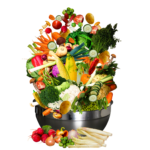
By MaryEllen Zung
What is a Whole-Foods, Plant-Based Diet?
For starters, a whole-foods, plant-based diet (WFPB) is not necessarily a set diet—it’s a
lifestyle. The food choices you make are the basis of this way of eating.
Plant-based diets vary widely according to the animal products a person chooses to
include in (and exclude from) their diet. More on this later.
The WFPB diet is based on a number of eating principals and is, therefore, pretty
flexible. The basic principles for this lifestyle aim to:
emphasize the intake of whole, minimally processed foods.
reduce, limit, or eliminate animal products.
focus intake on vegetables, fruits, whole grains, legumes, seeds, and nuts.
Exclude added sugar, enriched flour, and processed oils.
Source locally grown and organic food whenever possible.
According to the United Nations, “Choosing healthier traditional Mediterranean,
pescatarian, or vegetarian diets could not only boost human lifespans and quality of life
but also slash emissions and save habitat for endangered species.”
As I mentioned, there are different variations of the WFPB diet. Here is a brief outline of
each:
– Vegan: Excludes all animal products, especially meat, seafood, poultry, eggs, and
dairy.
– Raw: Same exclusions as a vegan diet as well as the exclusion of all foods cooked at
temperatures greater than 118°F.
– Lacto-vegetarian: Excludes eggs, meat, seafood, and poultry (Includes: milk
products).
– Ovo-vegetarian: Excludes meat, seafood, poultry, and dairy (Includes: eggs).
– Lacto-Ovo vegetarian: Excludes meat, seafood, and poultry (Includes: eggs and
dairy).
– Pescatarian: Excludes meat and poultry (Includes: seafood, eggs, and dairy).
There are two important things about these diets people forget to consider. One, while
these diets restrict animal products, this by itself does not automatically guarantee a
healthy diet. To ensure health on any diet, processed foods, unhealthy carbs, added
sugar, and excessive salt must be avoided.
Two, if one of these diets appeals to you, but the strictness doesn’t fit into your lifestyle,
you don’t have to pick one and stick to it 24/7. For example, many benefits are
associated with ‘weekday vegetarianism’ whereby you reduce your intake of animal
products during the week and incorporate healthier options on the weekends. In other
words, don’t get bogged down by diet definitions or expectations. Make your eating
experience one that you enjoy!
Mary Ellen Zung, BA is a Certified Holistic Health Coach helping her clients with lifestyle
change for overall health and wellness. She can be reached at coachmaryellen@outlook.com and through her website www.maryellenzung.com.
